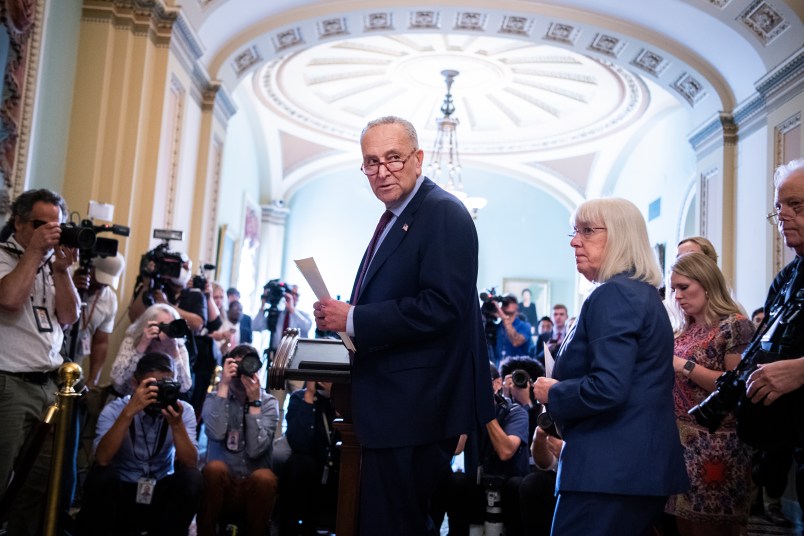While the bipartisan infrastructure bill hovers in limbo between life and death, Democrats are looking ahead to the reconciliation package which may ultimately subsume that hard infrastructure piece, should the bipartisan deal fail.
If it does go down, the collapse will trigger a new set of questions for Democrats to puzzle out: Will the bipartisan package get plopped, as is, into reconciliation? Or will Democrats renegotiate the proposals that were crafted with Republican input?
Many in the caucus indicated that they’d be satisfied with the former.
“Let’s do it as close to what the agreement was as we can,” Sen. Tim Kaine (D-VA) told TPM. “If the bipartisan thing doesn’t work, I will view that they made a strategic decision for some reason, they didn’t want to give Biden a win or whatever — but they had ideas, they were good ideas, they were negotiated, they are in the bill, they’re things that I like, so why not put them in?”
“I think that’s pretty much what the committee members thought we would do,” he added. Kaine is a member of the all-important Senate Budget Committee that will have great sway over crafting what ultimately becomes the reconciliation package.
Democrats only worked on hard infrastructure in the bipartisan bill in the first place to mollify moderates like Sen. Joe Manchin (D-WV), who demanded his colleagues make an effort with Republicans and that the topline of the reconciliation package be lowered. Senate Majority Leader Chuck Schumer (D-NY) used that to his advantage by keeping the bipartisan and reconciliation bills linked, in order to keep the moderate and progressive wings on board for the piece they’d be less naturally inclined to support.
Schumer has scheduled a vote on the unfinished bipartisan package Wednesday, an effort to hurry the legislation along and an acknowledgment of Democratic concerns that Republicans are just trying to run out the clock.
Democrats are very aware that they may not emerge from the 2022 midterms with the congressional control they have now. They’re also loath to repeat their Obama-era experience when Republicans pretended to cooperate in the forging of the Affordable Care Act, only to jump ship after dragging the process out for months.
That urgency factor prodded some Democrats into the “just plop the bipartisan package right in” bucket.
“I think time is not our friend, and we gotta move forward,” Sen. Sheldon Whitehouse (D-RI) told TPM. “The more we can move forward, the better off we’ll be.”
For others, the Democratic involvement in the crafting of the bipartisan package up until this point suffices.
“The bipartisan package already incorporates the work of our committees, so I would very much want that to go forward,” Sen. Ben Cardin (D-MD) told TPM.
For progressives, some of whom reserved the right to tinker around the edges of the bipartisan package if it fails, there may be bigger fish to fry than going back to the drawing board on hard infrastructure. Democrats have already previewed that they want to get universal pre-K, an extended child tax credit and the most ambitious climate legislation ever passed into the reconciliation package.
Sen. Elizabeth Warren (D-MA) pointed out to TPM that Democrats can just do virtually everything in the bipartisan deal themselves in reconciliation, though acknowledged that “whether the bipartisan bill has the exact details of either the funding amounts or the distribution to programs that Democrats want” is an outstanding question.
The bipartisan package has died and been resurrected at biblical speed over the past few weeks, with Republicans involved going through various outrage cycles: first about the always-transparent strategy that Democrats planned to pass both the bipartisan and reconciliation bills, now that Schumer is forcing floor action on the bipartisan bill.
Some Republicans have indicated that they will vote against the procedural vote Wednesday, though Schumer has provided some cushion for the negotiators to pull the text together by the end of the week.
But some Senate Democrats are getting impatient, and don’t see the point of waiting around for Republicans to get on board. They still have a reconciliation vehicle to use and are prepared to do hard infrastructure there too, with or without their GOP colleagues.
“I think there’s a lot of good stuff in the bipartisan package, although it’s not quite a package yet — I don’t mind dropping it right in there,” Sen. Brian Schatz (D-HI) told TPM of the reconciliation package. “Although it’s a product of a bipartisan negotiation, it seems to me that Republicans would not be in a position to negotiate for individual provisions anymore — if you’re not willing to get to ‘yes’ then it’s very difficult to have any leverage.”



